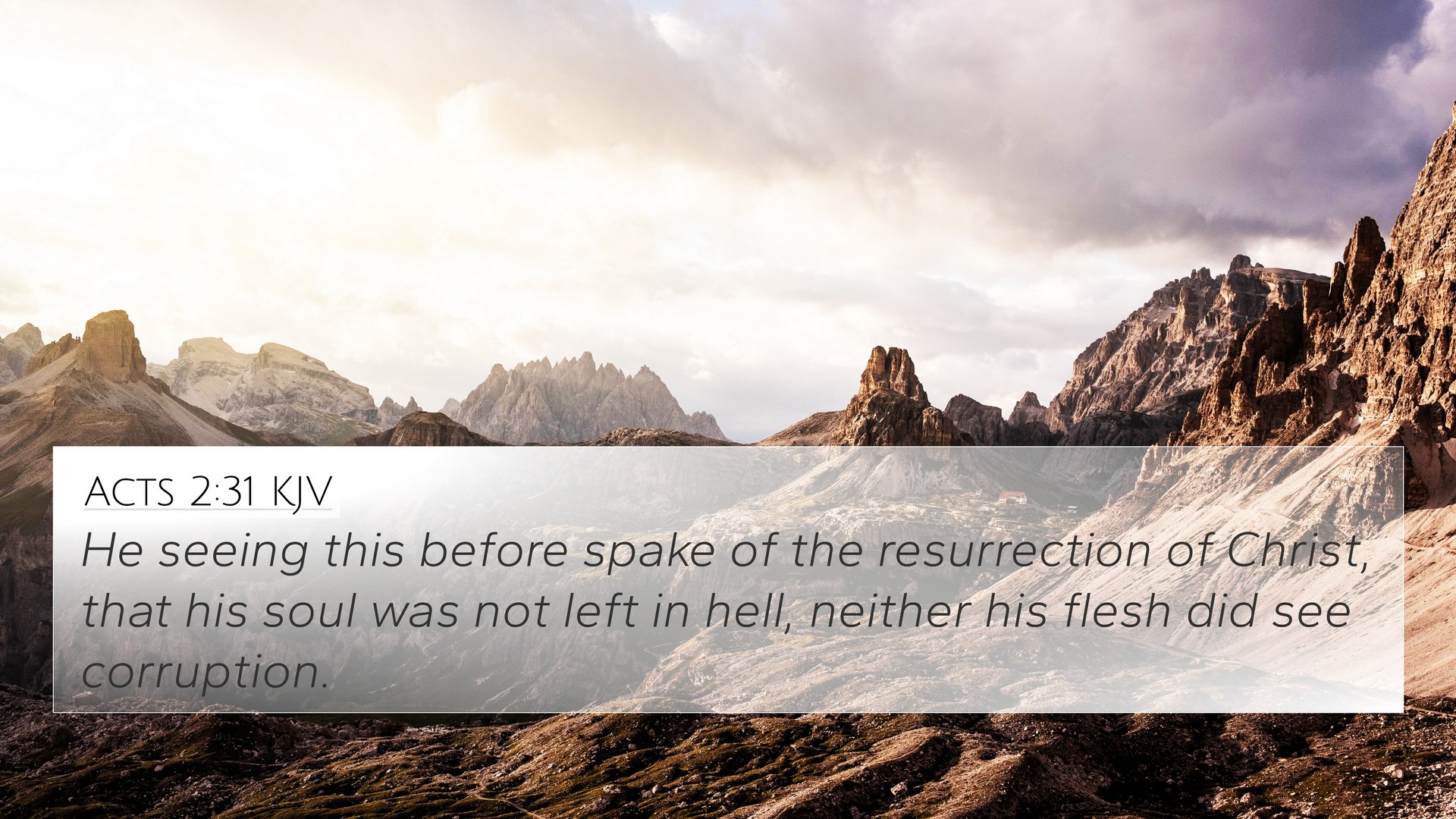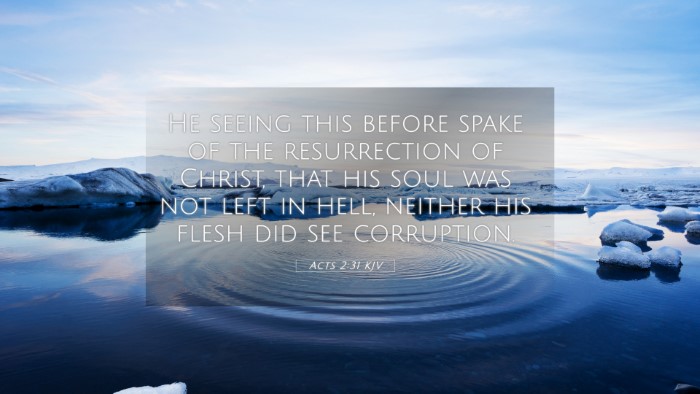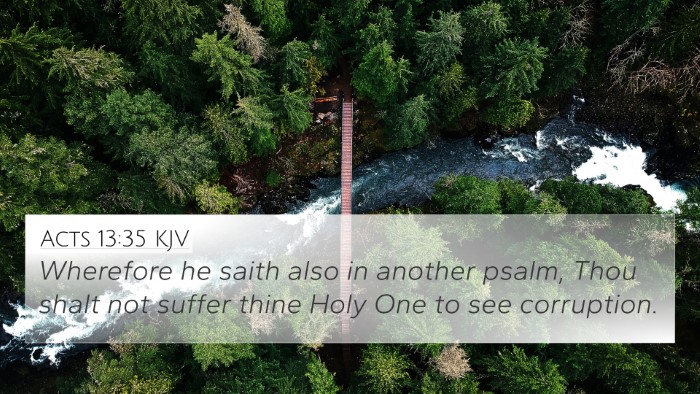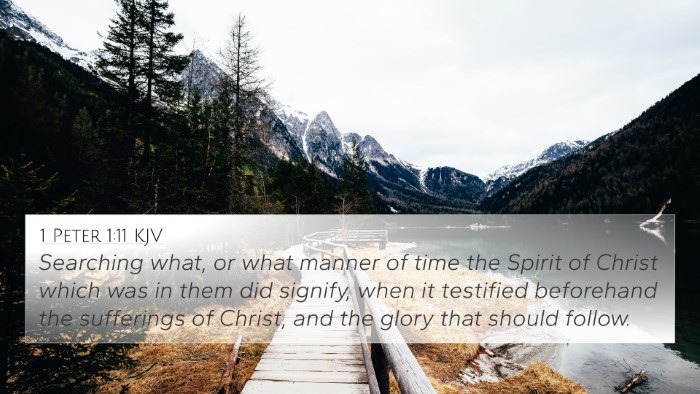Understanding Acts 2:31
Acts 2:31 states, "Seeing this before, spake of the resurrection of Christ, that his soul was not left in hell, neither his flesh did see corruption." This verse is pivotal in understanding the resurrection of Jesus Christ and connects deeply with both Old and New Testament scriptures. The interpretation of this verse reflects the assurance of Christ's triumph over death and serves as a cornerstone of Christian faith.
Commentary Insights
The insights from renowned public domain commentators render a multifaceted understanding of this verse:
-
Matthew Henry:
Henry emphasizes that this verse validates Peter's declaration of Christ's resurrection, establishing a doctrinal basis for the apostolic preaching. He notes the importance of the prophecy from David in the Psalms, asserting that Christ’s resurrection was foretold and hence a part of divine plan.
-
Albert Barnes:
Barnes points out that "his soul was not left in hell" refers to the state of the dead and clarifies that "hell" in this context should be understood as Hades, the place of departed souls, rather than the eternal hell of punishment. He highlights the significance of the resurrection not just as an event but as a fulfillment of prophecy that assures believers of eternal life.
-
Adam Clarke:
Clarke delves into the semantic interpretations of "soul" and "flesh," clarifying that the resurrection underscores the completeness of Christ’s victory over death. He stresses the theological implications that without the resurrection, faith would be worthless, linking this directly to the transformative power that believers experience through Christ’s victory.
Bible Verse Cross-References
To deepen the understanding of Acts 2:31, it is beneficial to explore related Bible verses that offer thematic connections and cross-references:
-
Psalm 16:10:
"For you will not abandon my soul to Sheol, or let your holy one see corruption." This verse serves as a direct prophecy referenced by Peter in his sermon.
-
Matthew 28:6:
"He is not here, for he has risen, as he said." This New Testament verses affirms the resurrection claim, linking back to Acts 2:31.
-
1 Corinthians 15:55:
"O death, where is your victory? O death, where is your sting?" This poignant questioning highlights the triumph over death celebrated in Acts 2:31.
-
Romans 6:9:
"We know that Christ, being raised from the dead, will never die again; death no longer has dominion over him." Here, the finality of Christ's victory over death is reiterated.
-
Acts 13:35:
"Therefore he says also in another psalm, You shall not let your Holy One see corruption." A discussion of resurrection, echoing the sentiments in Acts 2:31.
-
Hebrews 5:7:
"In the days of his flesh, Jesus offered up prayers and supplications, with loud cries and tears..." This further establishes the full humanity of Jesus, essential for understanding the resurrection.
-
Philippians 2:8-11:
"...he humbled himself by becoming obedient to the point of death, even death on a cross. Therefore God has highly exalted him..." showcasing the exaltation post-resurrection.
-
Revelation 1:18:
"And the Living One; I died, and behold I am alive forevermore, and I have the keys of Death and Hades." This emphasizes Christ’s authority following His resurrection.
Thematic Bible Verse Connections
Understanding Acts 2:31 opens pathways to explore broader themes in scripture, such as:
- The Resurrection: A defining moment in Christian theology, found throughout the Gospels and Epistles.
- The Fulfillment of Prophecy: Linking Old Testament prophecies to their New Testament fulfillments, establishing the divine plan.
- Victory Over Death: The implications of death's defeat as a thematic anchor in numerous scripture verses, granting hope to believers.
How to Use Bible Cross-References
Cross-referencing is a valuable method for a deeper understanding of Bible verses. Here are some tools and methods:
- Bible Concordance: Use a comprehensive concordance to locate connections between words and themes.
- Bible Cross-Reference Guide: Guides that detail links between verses can illuminate thematic ties.
- Cross-Reference Bible Study: Engage in studies focused on thematic parallels, revealing interconnections between scriptures.
Interpreting Biblical Themes through Cross-References
By utilizing cross-referencing methods, one can identify how various themes interlink throughout scripture, providing clarity and enhancing spiritual understanding. Acts 2:31 is foundational in establishing the divinity of Christ and His resurrection, which holds great importance across the entirety of scripture.
Conclusion
Acts 2:31 serves not only as a declaration of the resurrection but also as a connecting verse that unites various threads of biblical narrative. The insights from Matthew Henry, Albert Barnes, and Adam Clarke elucidate the rich theological implications of this verse, while the provided cross-references and thematic connections offer a broader context for understanding the entirety of biblical teaching regarding Christ's resurrection.






